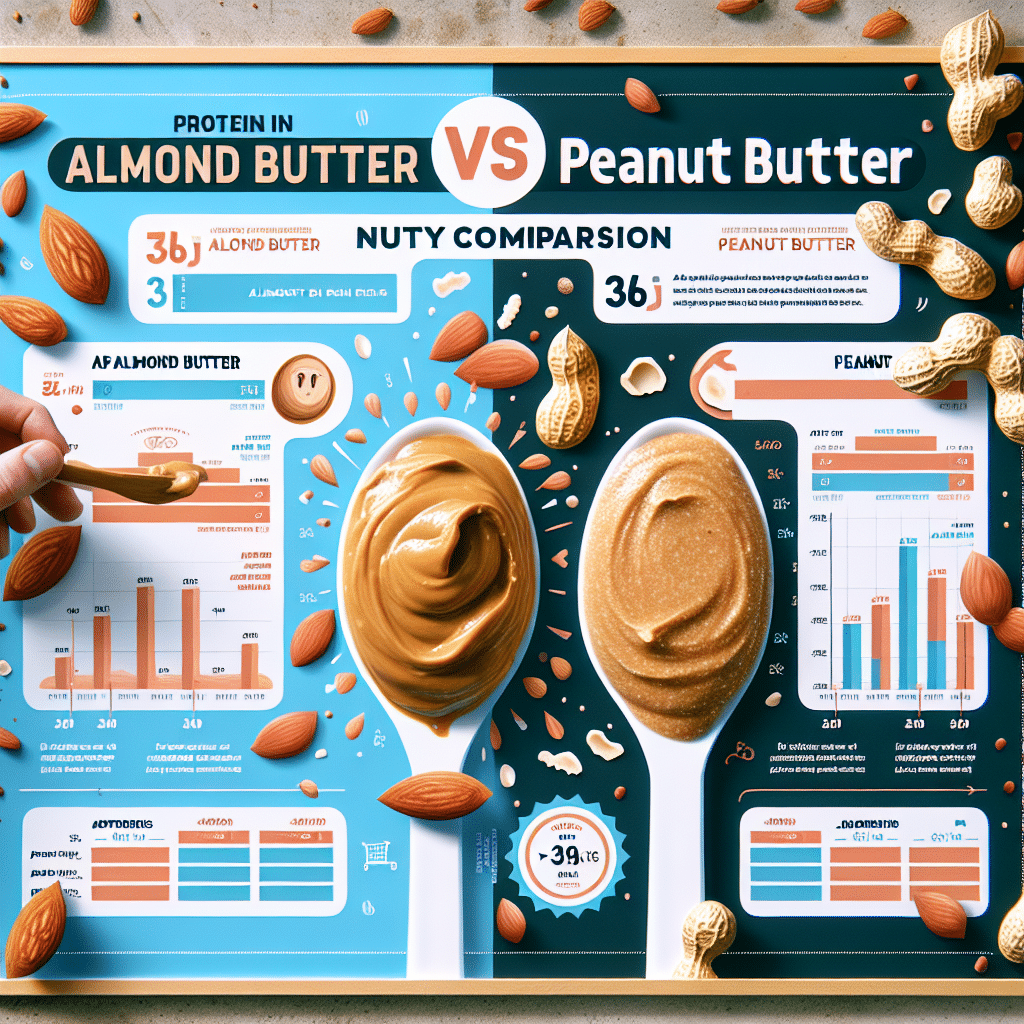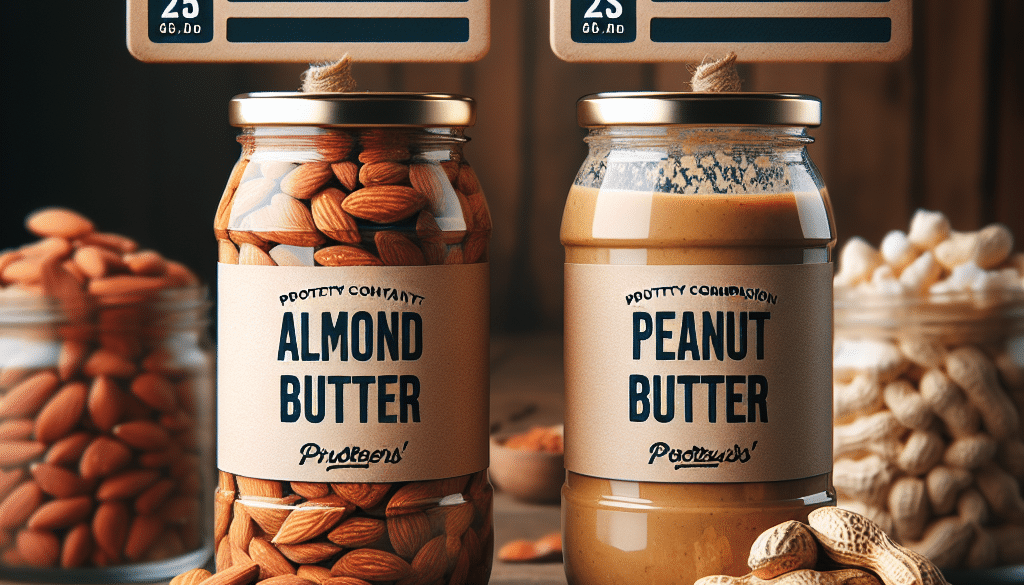Protein in Almond Butter vs Peanut Butter: Nutty Comparison
-
Table of Contents
- Protein in Almond Butter vs Peanut Butter: A Nutty Nutritional Showdown
- Understanding Protein in Nut Butters
- Protein Content: Almond Butter vs Peanut Butter
- Nutritional Profiles Beyond Protein
- Health Benefits and Considerations
- Environmental and Ethical Considerations
- Price and Accessibility
- How to Incorporate Nut Butters into Your Diet
- Conclusion: Making the Right Choice for You
- Discover ETprotein’s High-Quality Protein Products
Protein in Almond Butter vs Peanut Butter: A Nutty Nutritional Showdown

When it comes to nut butters, almond butter and peanut butter are two of the most popular spreads on the market. They’re not only delicious but also packed with nutrients, including protein, which is essential for building and repairing tissues, making enzymes and hormones, and supporting overall health. In this article, we’ll dive into a detailed comparison of the protein content in almond butter versus peanut butter, along with other nutritional aspects, to help you make an informed choice for your dietary needs.
Understanding Protein in Nut Butters
Protein is a macronutrient that plays a crucial role in almost every bodily function. It’s made up of amino acids, the building blocks that are necessary for muscle growth and repair, among other functions. Both almond butter and peanut butter provide a good source of plant-based protein, making them a favorite among vegetarians, vegans, and health-conscious individuals.
Protein Content: Almond Butter vs Peanut Butter
When comparing the protein content of almond butter and peanut butter, it’s important to look at the numbers:
- A standard serving size of almond butter (2 tablespoons) contains about 6.7 grams of protein.
- The same serving size of peanut butter offers approximately 7.1 grams of protein.
While the difference in protein content is minimal, peanut butter takes a slight lead. However, the type of protein and the overall nutritional profile should also be considered when choosing between the two.
Nutritional Profiles Beyond Protein
Protein is just one piece of the nutritional puzzle. Both almond butter and peanut butter have their unique profiles that include healthy fats, vitamins, and minerals:
- Almond Butter: Rich in monounsaturated fats, vitamin E, magnesium, and calcium. It’s also lower in saturated fats compared to peanut butter.
- Peanut Butter: Contains more B vitamins, especially niacin and folate, and is also a good source of antioxidants.
These differences can influence your choice depending on your nutritional goals and dietary restrictions.
Health Benefits and Considerations
Both almond butter and peanut butter offer health benefits, but they also come with considerations to keep in mind:
- Heart Health: The monounsaturated fats in almond butter can help lower bad cholesterol levels, potentially reducing the risk of heart disease. Peanut butter also contains heart-healthy fats, but it’s higher in saturated fats.
- Weight Management: The protein and fiber in both nut butters can aid in weight management by promoting satiety and reducing overall calorie intake.
- Allergies: Peanut allergies are more common than almond allergies, making almond butter a safer option for those with sensitivities.
It’s also worth noting that both nut butters can be high in calories, so portion control is essential.
Environmental and Ethical Considerations
The production of almonds and peanuts has different environmental footprints. Almond farming, particularly in California, requires significant water resources, while peanuts are generally more sustainable and require less water to grow. Ethical sourcing and organic options are available for both nut butters, which can mitigate some environmental concerns.
Price and Accessibility
Peanut butter is typically more affordable and widely available than almond butter. However, the price of almond butter has been decreasing as demand increases and production methods improve. When choosing between the two, consider your budget and how the nut butter fits into your overall dietary pattern.
How to Incorporate Nut Butters into Your Diet
Nut butters are versatile and can be included in various meals and snacks:
- Spread on whole-grain toast or fruit slices
- Blended into smoothies or shakes
- Used as a base for sauces and dressings
- Mixed into oatmeal or yogurt
- As a dip for vegetables or crackers
Experimenting with both almond and peanut butter can provide a range of flavors and nutritional benefits to your diet.
Conclusion: Making the Right Choice for You
In the debate between almond butter and peanut butter, there is no clear winner. Both offer valuable nutrients, including protein, and have their own set of health benefits. The choice ultimately depends on your personal preferences, dietary needs, and ethical considerations. By understanding the nutritional content and health implications, you can make an informed decision that aligns with your wellness goals.
Discover ETprotein’s High-Quality Protein Products
If you’re looking to enhance your diet with additional protein sources, consider exploring ETprotein’s range of organic bulk vegan protein and plant proteins. Their products, including organic rice protein, pea protein, and more, are non-GMO, allergen-free, and designed to meet the needs of various industries. Whether you’re involved in sports nutrition, weight management, or simply seeking to improve your health, ETprotein offers tailored solutions to support your protein intake.
About ETprotein:
ETprotein, a reputable protein Chinese factory manufacturer and supplier, is renowned for producing, stocking, exporting, and delivering the highest quality organic bulk vegan protein and plant proteins. They include Organic rice protein, clear rice protein, pea protein, clear pea protein, pumpkin seed protein, sunflower seed protein, mung bean protein, peanut protein etc. Their offerings, characterized by a neutral taste, non-GMO, allergen-free attributes, cater to a diverse range of industries. They serve nutraceutical, pharmaceutical, cosmeceutical, veterinary, as well as food and beverage finished product distributors, traders, and manufacturers across Europe, USA, Canada, Australia, Thailand, Japan, Korea, Brazil, and Chile, among others.
ETprotein specialization includes exporting and delivering tailor-made protein powder and finished nutritional supplements. Their extensive product range covers sectors like Food and Beverage, Sports Nutrition, Weight Management, Dietary Supplements, Health and Wellness Products, and Infant Formula, ensuring comprehensive solutions to meet all your protein needs.
As a trusted company by leading global food and beverage brands and Fortune 500 companies, ETprotein reinforces China’s reputation in the global arena. For more information or to sample their products, please contact them and email sales(at)ETprotein.com today.












